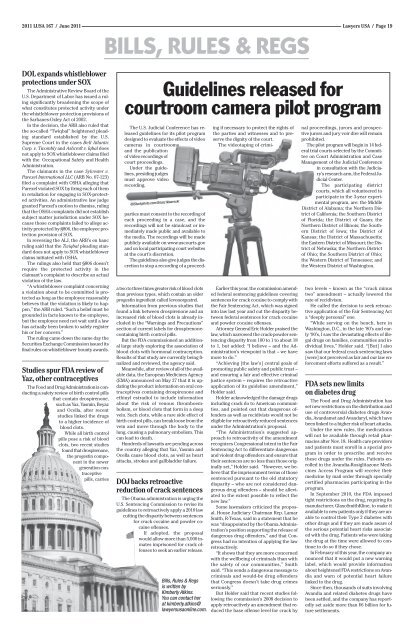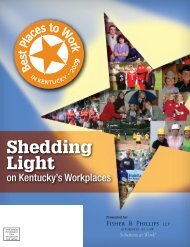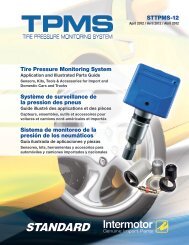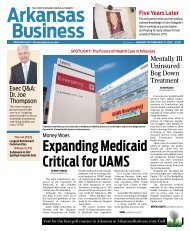NICU – Neonatal Intensive Care - Digital Publishing
NICU – Neonatal Intensive Care - Digital Publishing
NICU – Neonatal Intensive Care - Digital Publishing
You also want an ePaper? Increase the reach of your titles
YUMPU automatically turns print PDFs into web optimized ePapers that Google loves.
2011 LUSA 167 / June 2011 Lawyers USA / Page 19BILLS, RULES ®SDOL expands whistleblowerprotections under SOXThe Administrative Review Board of theU.S. Department of Labor has issued a rulingsignificantly broadening the scope ofwhat constitutes protected activity underthe whistleblower protection provisions ofthe Sarbanes-Oxley Act of 2002.In the decision, the ARB also ruled thatthe so-called “Twiqbal” heightened pleadingstandard established by the U.S.Supreme Court in the cases Bell AtlanticCorp. v. Twombly and Ashcroft v. Iqbal doesnot apply to SOX whistleblower claims filedwith the Occupational Safety and HealthAdministration.The claimants in the case Sylvester v.Parexel International LLC (ARB No. 07-123)filed a complaint with OSHA alleging thatParexel violated SOX by firing each of themin retaliation for engaging in SOX-protectedactivities. An administrative law judgegranted Parexel’s motion to dismiss, rulingthat the OSHA complaints did not establishsubject matter jurisdiction under SOX becausethose complaints failed to allege activityprotected by §806, the employee protectionprovision of SOX.In reversing the ALJ, the ARB’s en bancruling said that the Twiqbal pleading standarddoes not apply to SOX whistleblowerclaims initiated with OSHA.The rulings also held that §806 doesn’trequire the protected activity in theclaimant’s complaint to describe an actualviolation of the law.“A whistleblower complaint concerninga violation about to be committed is protectedas long as the employee reasonablybelieves that the violation is likely to happen,”the ARB ruled. “Such a belief must begrounded in facts known to the employee,but the employee need not wait until a lawhas actually been broken to safely registerhis or her concern.”The ruling came down the same day theSecurities Exchange Commission issued itsfinal rules on whistleblower bounty awards.Studies spur FDA review ofYaz, other contraceptivesThe Food and Drug Administration is conductinga safety review of birth control pillsthat contain drospirenone,such as Yaz, Yasmin, Beyazand Ocella, after recentstudies linked the drugsto a higher incidence ofblood clots.While all birth controlpills pose a risk of bloodclots, two recent studiesfound that drospirenone,the progestin componentin the newergeneration contraceptivepills, carriesGuidelines released forcourtroom camera pilot programThe U.S. Judicial Conference has releasedguidelines for its pilot programdesigned to evaluate the effects of videocameras in courtroomsand the publicationof video recordings ofcourt proceedings.Under the guidelines,presiding judgesmust approve videorecording,©iStockphoto.com/Ariusz Nawrockia two to three times greater risk of blood clotsthan previous types, which contain an olderprogestin ingredient called levonorgestrel.Information from previous studies thatfound a link between drospirenone and anincreased risk of blood clots is already includedin the “Warnings and Precautions”section of current labels for drospirenonecontainingbirth control pills.But the FDA commissioned an additionallarge study exploring the association ofblood clots with hormonal contraception.Results of that study are currently being finalizedand reviewed, the agency said.Meanwhile, after review of all of the availabledata, the European Medicines Agency(EMA) announced on May 27 that it is updatingthe product information on oral contraceptivescontaining drospirenone andethinyl estradiol to include informationabout the risk of venous thromboembolism,or blood clots that form in a deepvein. Such clots, while a rare side effect ofbirth control pills, can break loose from thevein and move through the body to thelung, causing a pulmonary embolism. Thiscan lead to death.Hundreds of lawsuits are pending acrossthe country alleging that Yaz, Yasmin andOcella cause blood clots, as well as heartattacks, strokes and gallbladder failure.DOJ backs retroactivereduction of crack sentencesThe Obama administration is urging theU.S. Sentencing Commission to revise itsguidelines to retroactively apply a 2010 lawcutting the disparity between sentencesfor crack cocaine and powder cocaineoffenses.If adopted, the proposalwould allow more than 5,000 inmatesimprisoned for crack offensesto seek an earlier release.Bills, Rules & Regsis written byKimberly Atkins.You can contact herat kimberly.atkins@lawyersusaonline.com.Earlier this year, the commission amendedfederal sentencing guidelines coveringsentences for crack cocaine to comply withthe Fair Sentencing Act, which was signedinto law last year and cut the disparity betweenfederal sentences for crack cocaineand powder cocaine offenses.Attorney General Eric Holder praised thelaw, which narrowed the crack-powder sentencingdisparity from 100 to 1 to about 18to 1, but added: “I believe <strong>–</strong> and the Administration’sviewpoint is that <strong>–</strong> we havemore to do.”“Achieving [the law’s] central goals ofpromoting public safety and public trust <strong>–</strong>and ensuring a fair and effective criminaljustice system <strong>–</strong> requires the retroactiveapplication of its guideline amendment,”Holder said.Holder acknowledged the damage drugsincluding crack do to American communities,and pointed out that dangerous offendersas well as recidivists would not beeligible for retroactively reduced sentencesunder the Administration’s proposal.“The Administration’s suggested approachto retroactivity of the amendmentrecognizes Congressional intent in the FairSentencing Act to differentiate dangerousand violent drug offenders and ensure thattheir sentences are no less than those originallyset,” Holder said. “However, we believethat the imprisonment terms of thosesentenced pursuant to the old statutorydisparity <strong>–</strong> who are not considered dangerousdrug offenders <strong>–</strong> should be alleviatedto the extent possible to reflect thenew law.”Some lawmakers criticized the proposal.House Judiciary Chairman Rep. LamarSmith, R-Texas, said in a statement that hewas “disappointed by the Obama Administration’sposition supporting the release ofdangerous drug offenders,” and that Congresshad no intention of applying the lawretroactively.“It shows that they are more concernedwith the wellbeing of criminals than withthe safety of our communities,” Smithsaid. “This sends a dangerous message tocriminals and would-be drug offendersthat Congress doesn’t take drug crimesseriously.”But Holder said that recent studies followingthe commission’s 2008 decision toapply retroactively an amendment that reducedthe base offense level for crack byparties must consent to the recording ofeach proceeding in a case, and therecordings will not be simulcast or immediatelymade public and available tothe media. The recordings will be madepublicly available on www.uscourts.govand on local participating court websitesat the court’s discretion.The guidelines also give judges the discretionto stop a recording of a proceedingif necessary to protect the rights ofthe parties and witnesses and to preservethe dignity of the court.The videotaping of criminalproceedings, jurors and prospectivejurors and jury voir dire will remainprohibited.The pilot program will begin in 14 federaltrial courts selected by the Committeeon Court Administration and CaseManagement of the Judicial Conferencein consultation with the Judiciary’sresearch arm, the Federal JudicialCenter.The participating districtcourts, which all volunteered toparticipate in the 3-year experimentalprogram, are: the MiddleDistrict of Alabama; the Northern Districtof California; the Southern Districtof Florida; the District of Guam; theNorthern District of Illinois; the SouthernDistrict of Iowa; the District ofKansas; the District of Massachusetts;the Eastern District of Missouri; the Districtof Nebraska; the Northern Districtof Ohio; the Southern District of Ohio;the Western District of Tennessee; andthe Western District of Washington.two levels <strong>–</strong> known as the “crack minustwo” amendment <strong>–</strong> actually lowered therate of recidivism.He called the decision to seek retroactiveapplication of the Fair Sentencing Acta “deeply personal” one.“While serving on the bench, here inWashington, D.C., in the late ‘80’s and early‘90’s, I saw the devastating effects of illegaldrugs on families, communities and individuallives,” Holder said. “[But] I alsosaw that our federal crack sentencing laws[were] not perceived as fair and our law enforcementefforts suffered as a result.”FDA sets new limitson diabetes drugThe Food and Drug Administration hasset new restrictions on the distribution anduse of controversial diabetes drugs Avandia,Avandamet and Avandaryl, which havebeen linked to a higher risk of heart attacks.Under the new rules, the medicationswill not be available through retail pharmaciesafter Nov. 18. Health care providersand patients must enroll in a special programin order to prescribe and receivethese drugs under the rules. Patients enrolledin the Avandia-Rosiglitazone MedicinesAccess Program will receive theirmedicine by mail order through speciallycertified pharmacies participating in theprogram.In September 2010, the FDA imposedtight restrictions on the drug, requiring itsmanufacturer, GlaxoSmithKline, to make itavailable to new patients only if they are unableto control their Type 2 diabetes withother drugs and if they are made aware ofthe serious potential heart risks associatedwith the drug. Patients who were takingthe drug at the time were allowed to continueto do so if they chose.In February of this year, the company announcedthat it would put a new warninglabel, which would provide informationabout heightened FDA restrictions on Avandiaand warn of potential heart failurelinked to the drug.Since then, thousands of suits involvingAvandia and related diabetes drugs havebeen settled, and the company has reportedlyset aside more than $6 billion for futuresettlements.
















